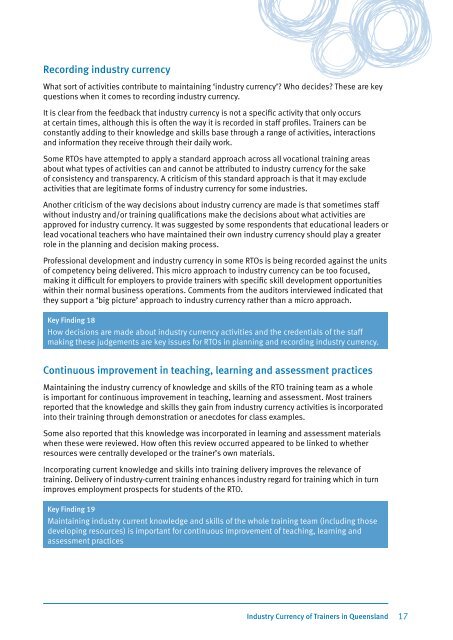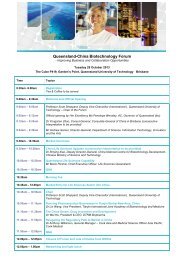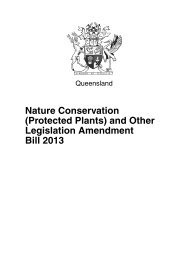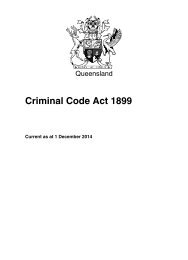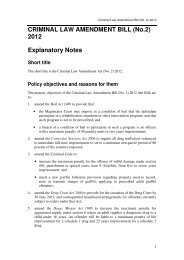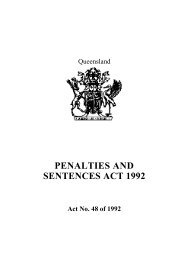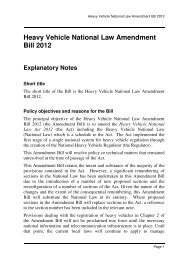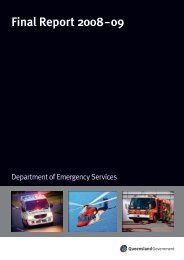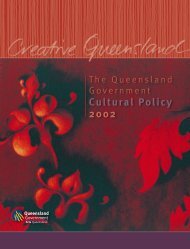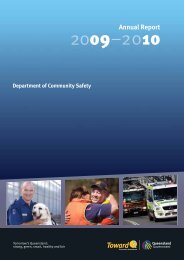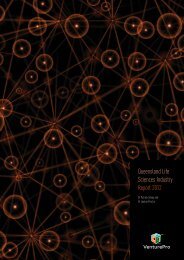Keeping it real - the Queensland VET Development Centre
Keeping it real - the Queensland VET Development Centre
Keeping it real - the Queensland VET Development Centre
- No tags were found...
You also want an ePaper? Increase the reach of your titles
YUMPU automatically turns print PDFs into web optimized ePapers that Google loves.
Recording industry currencyWhat sort of activ<strong>it</strong>ies contribute to maintaining ‘industry currency’? Who decides? These are keyquestions when <strong>it</strong> comes to recording industry currency.It is clear from <strong>the</strong> feedback that industry currency is not a specific activ<strong>it</strong>y that only occursat certain times, although this is often <strong>the</strong> way <strong>it</strong> is recorded in staff profiles. Trainers can beconstantly adding to <strong>the</strong>ir knowledge and skills base through a range of activ<strong>it</strong>ies, interactionsand information <strong>the</strong>y receive through <strong>the</strong>ir daily work.Some RTOs have attempted to apply a standard approach across all vocational training areasabout what types of activ<strong>it</strong>ies can and cannot be attributed to industry currency for <strong>the</strong> sakeof consistency and transparency. A cr<strong>it</strong>icism of this standard approach is that <strong>it</strong> may excludeactiv<strong>it</strong>ies that are leg<strong>it</strong>imate forms of industry currency for some industries.Ano<strong>the</strong>r cr<strong>it</strong>icism of <strong>the</strong> way decisions about industry currency are made is that sometimes staffw<strong>it</strong>hout industry and/or training qualifications make <strong>the</strong> decisions about what activ<strong>it</strong>ies areapproved for industry currency. It was suggested by some respondents that educational leaders orlead vocational teachers who have maintained <strong>the</strong>ir own industry currency should play a greaterrole in <strong>the</strong> planning and decision making process.Professional development and industry currency in some RTOs is being recorded against <strong>the</strong> un<strong>it</strong>sof competency being delivered. This micro approach to industry currency can be too focused,making <strong>it</strong> difficult for employers to provide trainers w<strong>it</strong>h specific skill development opportun<strong>it</strong>iesw<strong>it</strong>hin <strong>the</strong>ir normal business operations. Comments from <strong>the</strong> aud<strong>it</strong>ors interviewed indicated that<strong>the</strong>y support a ‘big picture’ approach to industry currency ra<strong>the</strong>r than a micro approach.Key Finding 18How decisions are made about industry currency activ<strong>it</strong>ies and <strong>the</strong> credentials of <strong>the</strong> staffmaking <strong>the</strong>se judgements are key issues for RTOs in planning and recording industry currency.Continuous improvement in teaching, learning and assessment practicesMaintaining <strong>the</strong> industry currency of knowledge and skills of <strong>the</strong> RTO training team as a wholeis important for continuous improvement in teaching, learning and assessment. Most trainersreported that <strong>the</strong> knowledge and skills <strong>the</strong>y gain from industry currency activ<strong>it</strong>ies is incorporatedinto <strong>the</strong>ir training through demonstration or anecdotes for class examples.Some also reported that this knowledge was incorporated in learning and assessment materialswhen <strong>the</strong>se were reviewed. How often this review occurred appeared to be linked to whe<strong>the</strong>rresources were centrally developed or <strong>the</strong> trainer’s own materials.Incorporating current knowledge and skills into training delivery improves <strong>the</strong> relevance oftraining. Delivery of industry-current training enhances industry regard for training which in turnimproves employment prospects for students of <strong>the</strong> RTO.Key Finding 19Maintaining industry current knowledge and skills of <strong>the</strong> whole training team (including thosedeveloping resources) is important for continuous improvement of teaching, learning andassessment practicesIndustry Currency of Trainers in <strong>Queensland</strong>17


